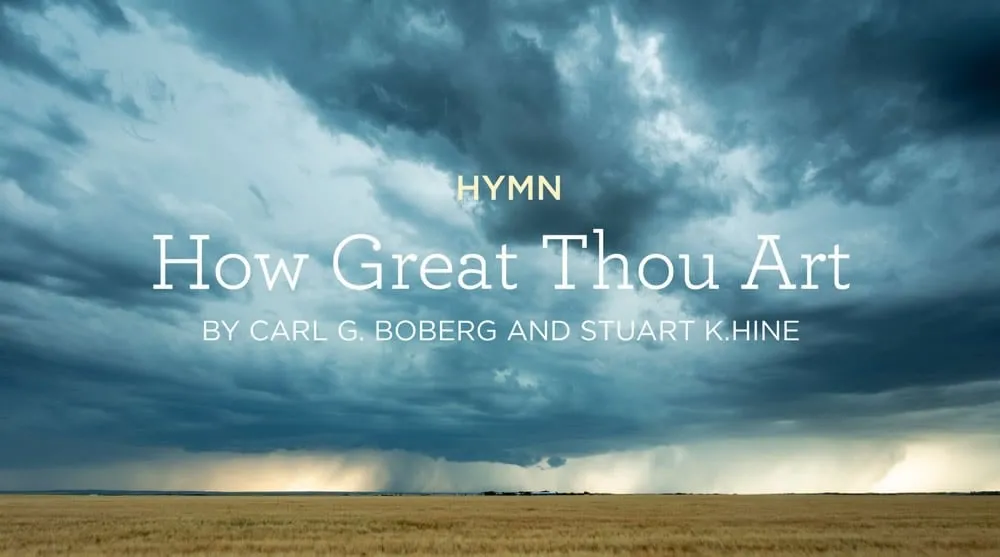
Here are some quick facts about "How Great Thou Art" and the meaning behind the lyrics;
Who Wrote How Great Thou Art Lyrics?
The hymn "How Great Thou Art" originated as a poem written by Carl Gustav Boberg, a Swedish pastor, and it was first published under the title "O Store Gud" (O Great God). Boberg wrote the poem after being inspired by the beauty of nature, particularly a thunderstorm followed by a peaceful sunset. The original poem consisted of nine verses.
The English version of the hymn that is widely known today is based on a translation by Stuart K. Hine, a British missionary and hymnwriter. Hine made significant modifications and additions to Boberg's original text, creating the version that has become a staple in Christian worship.
The hymn has since been translated into numerous languages, and various artists and congregations around the world have recorded and performed it, contributing to its global popularity.
What Genre Does How Great Thou Art Belong To?
"How Great Thou Art" is generally categorized as a Christian hymn. The hymn genre is characterized by its religious and devotional nature, often featuring lyrics that express praise, worship, or contemplation of theological themes. Hymns are commonly sung in religious gatherings, including church services, and they often have a structured and melodic musical arrangement.
While "How Great Thou Art" falls under the broader category of hymns, it also incorporates elements of Christian worship music. The hymn has been arranged in various musical styles over the years, and different renditions may include orchestral, choral, or contemporary arrangements. Despite these variations, the core of "How Great Thou Art" remains rooted in the hymn tradition.
When Was How Great Thou Art Released?
"How Great Thou Art" was originally written in 1885 by Carl Gustav Boberg as a poem titled "O Store Gud" (O Great God) in Swedish. Boberg's poem was later set to music by Swedish musician Gustav L. Storm and became a hymn in Sweden.
The English version of the hymn, based on a translation by Stuart K. Hine, was first published in 1949. This English adaptation is the version that is widely known and sung in English-speaking Christian congregations around the world.
As a hymn, "How Great Thou Art" doesn't have a traditional "release" date like commercial music. It gradually gained popularity over time as it was translated into different languages and became a cherished part of Christian worship.
Full Meaning Behind How Great Thou Art Lyrics
Verse 1: Awe in Nature's Grandeur
The opening verse sets the stage for the hymn's overarching theme—the magnificence of God as revealed in the wonders of creation. The lyrics evoke a sense of awe and humility as the singer reflects on the vastness of the universe and the beauty of nature:
"O Lord my God, when I in awesome wonder
Consider all the worlds Thy hands have made."
These lines convey a deep appreciation for the Creator's artistry, inviting believers to marvel at the complexity and splendor of the world around them.
Chorus: Proclaiming God's Greatness
The chorus serves as a resounding declaration of God's greatness and the singer's response to the overwhelming sense of awe:
"Then sings my soul, my Savior God, to Thee:
How great Thou art, how great Thou art!"
This expression of praise is a central theme throughout the hymn, emphasizing the personal and emotional connection between the worshiper and the divine.
Verse 2: Contemplating the Incarnation
The second verse delves into the Christian doctrine of the Incarnation—the belief that God became flesh in the person of Jesus Christ. The lyrics reflect on Christ's sacrifice and express gratitude for the redemptive work accomplished through the crucifixion:
"And when I think that God, His Son not sparing,
Sent Him to die, I scarce can take it in."
These lines underscore the profound theological significance of Jesus' sacrificial death, emphasizing the depth of God's love for humanity.
Verse 3: Anticipation of Christ's Return
The third verse looks forward to the future return of Christ and the believer's anticipation of that glorious moment:
"When Christ shall come with shout of acclamation
And take me home, what joy shall fill my heart."
This verse adds a forward-looking dimension to the hymn, acknowledging the Christian hope of being reunited with God in eternity.
Bridge: Personal Testimony
The bridge of "How Great Thou Art" often varies in different renditions, but it commonly serves as a personal testimony, expressing the singer's intimate relationship with God. This section allows for individual reflection and the incorporation of personal experiences into the broader narrative of faith.
Final Verse: Universal Worship
The final verse broadens the hymn's perspective, inviting all of creation to join in worship:
"When Christ shall come, with shout of acclamation,
And take me home, what joy shall fill my heart.
Then I shall bow in humble adoration
And there proclaim, 'My God, how great Thou art!'"
This inclusive language expands the hymn's scope, emphasizing the universal nature of worship and acknowledging the entirety of creation's response to the divine.
Conclusion: The Timeless Impact of "How Great Thou Art"
In conclusion, "How Great Thou Art" transcends its origins as a Swedish poem, resonating across cultures and denominations as a hymn that encapsulates the essence of Christian worship. The hymn's enduring popularity lies in its ability to evoke a sense of wonder, reverence, and gratitude for the divine. Through its timeless verses, "How Great Thou Art" continues to inspire believers to reflect on the greatness of God in creation, salvation, and the hope of eternity. As congregations around the world unite in singing this hymn, they participate in a rich tradition of worship that spans generations, proclaiming the greatness of God with each soul-stirring note.





























